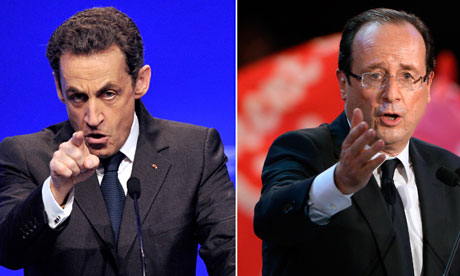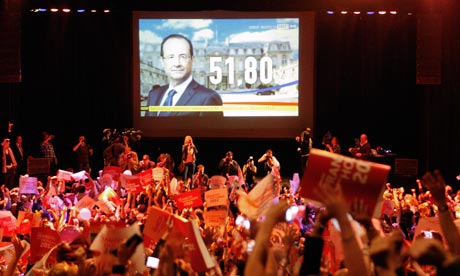Nicolas Sarkozy concedes defeat to Socialist party candidate, who has become first left-wing president in almost 20 years.
Read: Nicolas Sarkozy defeated by François Hollande.
Also read: French president François Hollande promises 'a new start' for Europe
Read: Nicolas Sarkozy defeated by François Hollande.
-
guardian.co.uk,

Nicolas Sarkozy (left) and François Hollande (right). Photograph: Thierry Zoccolan/AFP/Getty Images

François Hollande supporters react in a
concert hall in Villeurbanne to a projection showing that the Socialist
party candidate had won the French election. Photograph: Reuters
François Hollande
has won power in France, turning the tide on a rightwards and
xenophobic lurch in European politics and vowing to transform Europe's
handling of the economic crisis by fighting back against German-led
austerity measures.
The 57-year-old rural MP and self-styled Mr Normal, a moderate social democrat from the centre of the Socialist party, is France's first leftwing president in almost 20 years. Projections from early counts, released by French TV, put his score at 51.9%.
His emphatic victory is a boost to the left in a continent that has gradually swung rightwards since the economic crisis broke four years ago.
Nicolas Sarkozy, defeated after one term in office, became the 11th European leader to lose power since the economic crisis in 2008.
He conceded defeat at a gathering of his party activists at the Mutualité in central Paris, urging them from the stage to stop booing Hollande. "I carry all the responsibility for this defeat," he said.
He had spoken to Hollande to congratulate him. "From the bottom of my heart I want France to succeed with the challenges it faces. It is something much greater than us; France. This evening we must think exclusively of France."
He said that after 35 years in politics and 10 years at the top of government, he would now become a simple "Frenchman among the French".
The defeat of the most unpopular French president ever to run for re-election was not simply the result of the global financial crisis or eurozone debt turmoil. It was also down to the intense public dislike of the man viewed by many as the "president of the rich" who had swept to victory in 2007 with a huge mandate to change France. The majority of French people felt he had failed to deliver on his promises, and he was criticised for his ostentatious display of wealth, favouring the rich and leaving behind over 2.8 million unemployed. Political analysts said anti-Sarkozy sentiment had become a cultural phenomenon in France.
Hollande is the first Socialist president to win a French election since François Mitterrand's re-election in 1988. Hours before the official announcement, hordes of cheering supporters began gathering at Paris's Place de la Bastille, a flashpoint of the 1789 French revolution, where the left had celebrated Mitterrand's first historic victory in 1981. The right has held the French presidency since Jacques Chirac's victory in 1995.
Hollande's first move as president will be to push Germany to renegotiate Europe's budget discipline pact to include a clause on growth. He has vowed to push growth measures to the centre of Brussels' handling of the eurozone crisis.
Ségolène Royal, Hollande's former partner who was defeated by Sarkozy in 2007, said France had voted for change and a new approach to European economic policy. Manuel Valls, tipped for a cabinet post, said Hollande now had to reconcile a France that had been divided during Sarkozy's term.
Hollande's victory comes after a brutal and vitriolic campaign marked by the high score of the farright Front National's Marine Le Pen, who came third in the first round with 17.9% and 6.4m votes. Sarkozy, who had launched his campaign in February with a marked rightwing slant on the values of work, family and national identity, lurched even further towards the extreme right as he courted Le Pen's voters in the past two weeks, stressing the far-right topics of immigration, borders and fear of Islam.
Hollande, who has vowed to begin his reforms as soon as he takes office on 15 May, has accepted he will have "no state of grace" leading a country crippled by public debt and in economic crisis, with unemployment nudging a record 10%, a gaping trade-deficit, stuttering growth and declining industry. France's public debt is so high that interest repayments alone account for the second highest state expenditure after education.
The rating agency Standards and Poors this year downgraded France's triple-A credit rating, saying that over-high state spending was straining public finances. During the campaign, both Hollande and Sarkozy had promised to balance the books, – France hasn't had a balanced budget for over 30 years.
Hollande's manifesto is based on scrapping Sarkozy's tax-breaks for the rich and putting up taxes for high earners to finance what he deems essential spending, including creating 60,000 posts in France's under-performing school system. He has pledged to keep the public deficit capped, but for his delicate balancing act to work, he needs a swift return to growth in France, despite economists warning of over-optimistic official growth forecasts that need to be trimmed.
Asked on Friday what he would do if he loses, Sarkozy said simply: "There will be a handover of power. The nation follows its course. The nation is stronger than the destiny of the men who serve it," he said.
The turn-out was high, estimated at around 80%.
The 57-year-old rural MP and self-styled Mr Normal, a moderate social democrat from the centre of the Socialist party, is France's first leftwing president in almost 20 years. Projections from early counts, released by French TV, put his score at 51.9%.
His emphatic victory is a boost to the left in a continent that has gradually swung rightwards since the economic crisis broke four years ago.
Nicolas Sarkozy, defeated after one term in office, became the 11th European leader to lose power since the economic crisis in 2008.
He conceded defeat at a gathering of his party activists at the Mutualité in central Paris, urging them from the stage to stop booing Hollande. "I carry all the responsibility for this defeat," he said.
He had spoken to Hollande to congratulate him. "From the bottom of my heart I want France to succeed with the challenges it faces. It is something much greater than us; France. This evening we must think exclusively of France."
He said that after 35 years in politics and 10 years at the top of government, he would now become a simple "Frenchman among the French".
The defeat of the most unpopular French president ever to run for re-election was not simply the result of the global financial crisis or eurozone debt turmoil. It was also down to the intense public dislike of the man viewed by many as the "president of the rich" who had swept to victory in 2007 with a huge mandate to change France. The majority of French people felt he had failed to deliver on his promises, and he was criticised for his ostentatious display of wealth, favouring the rich and leaving behind over 2.8 million unemployed. Political analysts said anti-Sarkozy sentiment had become a cultural phenomenon in France.
Hollande is the first Socialist president to win a French election since François Mitterrand's re-election in 1988. Hours before the official announcement, hordes of cheering supporters began gathering at Paris's Place de la Bastille, a flashpoint of the 1789 French revolution, where the left had celebrated Mitterrand's first historic victory in 1981. The right has held the French presidency since Jacques Chirac's victory in 1995.
Hollande's first move as president will be to push Germany to renegotiate Europe's budget discipline pact to include a clause on growth. He has vowed to push growth measures to the centre of Brussels' handling of the eurozone crisis.
Ségolène Royal, Hollande's former partner who was defeated by Sarkozy in 2007, said France had voted for change and a new approach to European economic policy. Manuel Valls, tipped for a cabinet post, said Hollande now had to reconcile a France that had been divided during Sarkozy's term.
Hollande's victory comes after a brutal and vitriolic campaign marked by the high score of the farright Front National's Marine Le Pen, who came third in the first round with 17.9% and 6.4m votes. Sarkozy, who had launched his campaign in February with a marked rightwing slant on the values of work, family and national identity, lurched even further towards the extreme right as he courted Le Pen's voters in the past two weeks, stressing the far-right topics of immigration, borders and fear of Islam.
Hollande, who has vowed to begin his reforms as soon as he takes office on 15 May, has accepted he will have "no state of grace" leading a country crippled by public debt and in economic crisis, with unemployment nudging a record 10%, a gaping trade-deficit, stuttering growth and declining industry. France's public debt is so high that interest repayments alone account for the second highest state expenditure after education.
The rating agency Standards and Poors this year downgraded France's triple-A credit rating, saying that over-high state spending was straining public finances. During the campaign, both Hollande and Sarkozy had promised to balance the books, – France hasn't had a balanced budget for over 30 years.
Hollande's manifesto is based on scrapping Sarkozy's tax-breaks for the rich and putting up taxes for high earners to finance what he deems essential spending, including creating 60,000 posts in France's under-performing school system. He has pledged to keep the public deficit capped, but for his delicate balancing act to work, he needs a swift return to growth in France, despite economists warning of over-optimistic official growth forecasts that need to be trimmed.
Asked on Friday what he would do if he loses, Sarkozy said simply: "There will be a handover of power. The nation follows its course. The nation is stronger than the destiny of the men who serve it," he said.
The turn-out was high, estimated at around 80%.

No comments:
Post a Comment